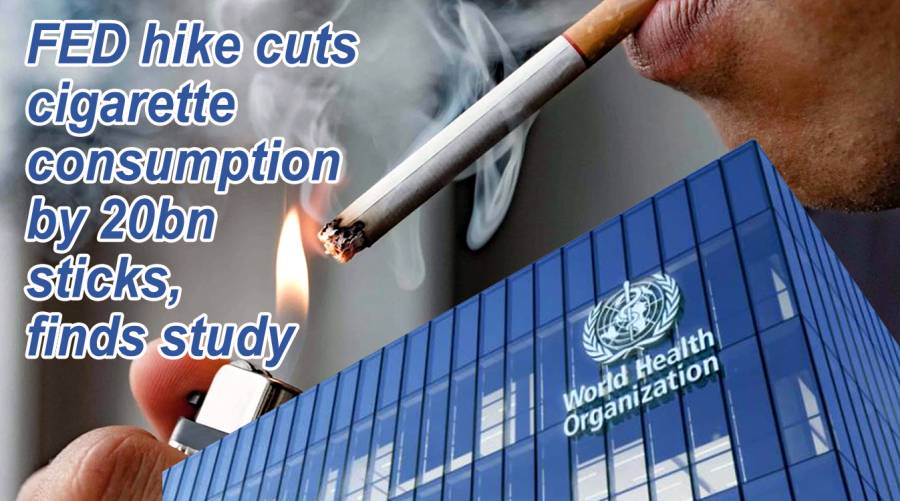FED hike cuts cigarette consumption by 20bn sticks, finds study

ISLAMABAD: Pakistan's decision to implement a substantial 146 percent increase in the Federal Excise Duty (FED) on cigarettes, in line with the World Health Organization's (WHO) recommendations, has resulted in a significant reduction of 20 billion cigarette sticks.
The success of the government’s move has been noted by Capital Calling, a network of academic researchers and professionals, in its recent report.
Implemented in February 2023, the FED rate hike challenges the misconception that higher cigarette taxes lead to lower government revenues. The WHO Framework Convention on Tobacco Control (FCTC) recognises taxation as the most effective means of reducing tobacco use, particularly among young individuals and low-income groups.
Market research conducted by Capital Calling supports this notion, revealing an inverse correlation between the recent FED hike and cigarette consumption.
Survey results indicate that over 11 billion fewer cigarettes were consumed, with a 14 percent decrease in smoking prevalence following the introduction of higher FED rates. Furthermore, 10 percent of respondents reduced their cigarette consumption due to the increased prices, resulting in an overall reduction of approximately 20 billion cigarette sticks annually.
In 2022, total cigarette consumption, encompassing officially declared production, smuggled cigarettes, counterfeit products, and untaxed cigarettes, ranged between 72 to 80 billion sticks. The recent study demonstrates a decrease to around 62 to 64 billion sticks, directly attributed to the significant FED rate increase.
The unprecedented FED rate hike by the Federal Board of Revenue (FBR) has substantially boosted government revenues. Expected revenue from cigarettes is estimated to reach Rs230-240 billion, marking a significant increase from Rs83 billion in 2017 and Rs87 billion in 2018.
The introduction of the controversial third tier in FED on cigarettes had contributed to an increase in smoking-related deaths, rising from 160,000 in 2016 to 337,500 deaths in 2020.
With declining cigarette consumption, it is anticipated that healthcare costs associated with smoking will decrease, leading to a substantial reduction in smoking-related fatalities. The positive impact of this fiscal measure aligns with global efforts to curb tobacco use and its associated health risks.
Trending
Popular
Sindh pledges vigorous action to prevent poliovirus transmission
-
PMA stresses health equity on World ...
04:08 PM, 9 Apr, 2024 -
Dow University’s new rabies vaccine ...
12:18 PM, 28 Mar, 2024 -
IRD role lauded in advancing ...
02:53 PM, 12 Mar, 2024 -
Over one billion people worldwide ...
09:48 AM, 5 Mar, 2024




